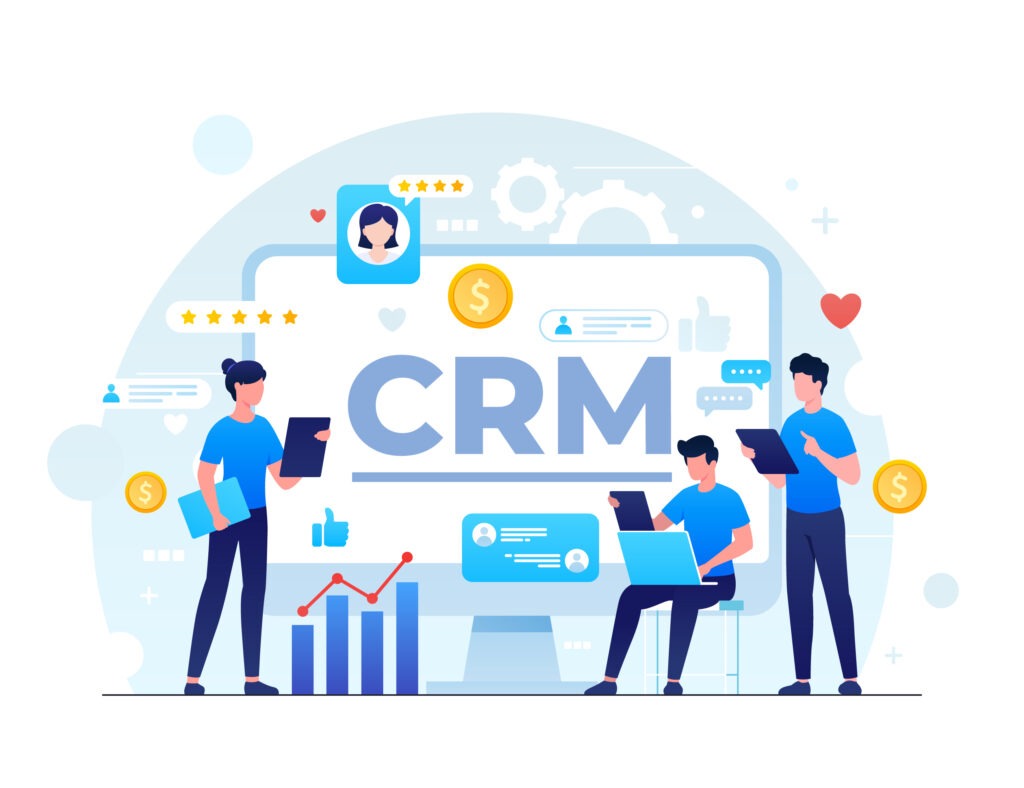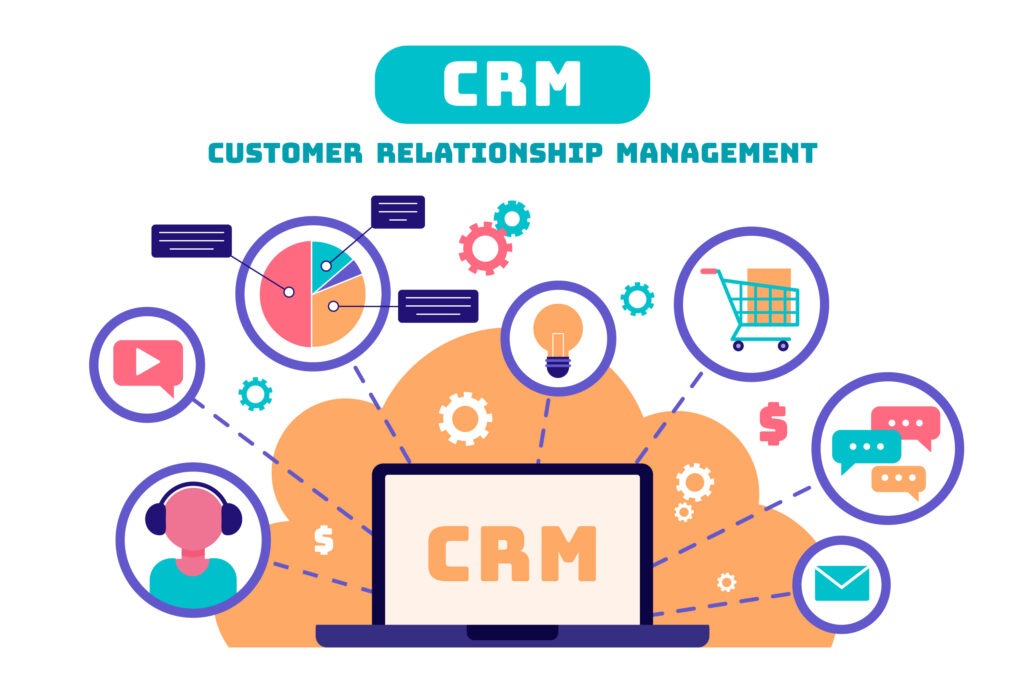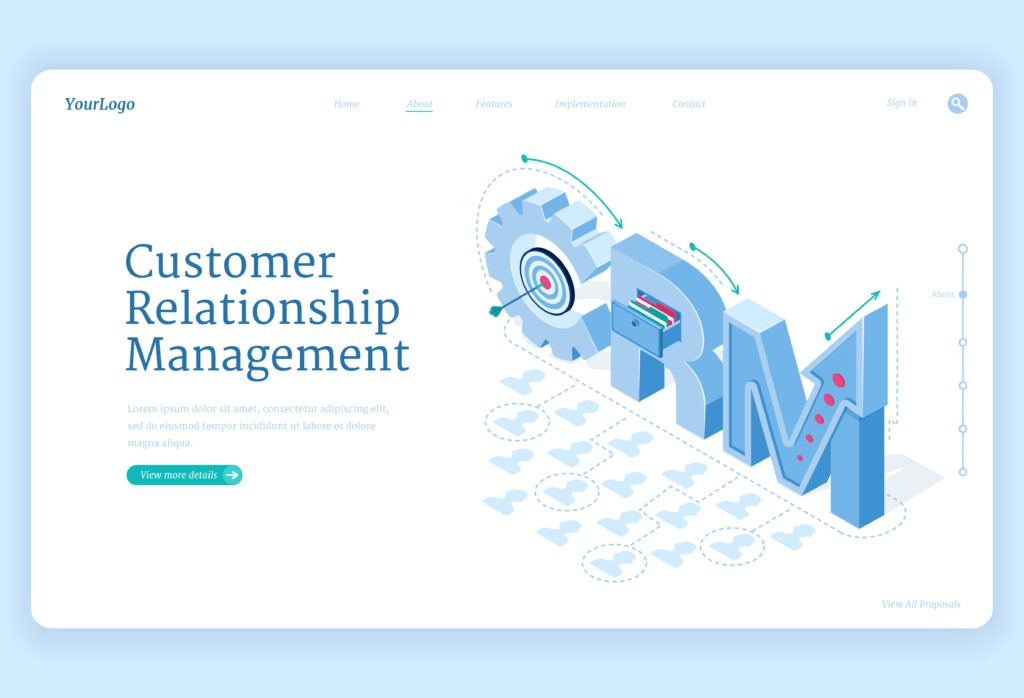In the rapidly evolving landscape of digital marketing, building and maintaining strong customer relationships is more critical than ever. The advent of technology has transformed the way businesses interact with their customers, and Customer Relationship Management (CRM) has emerged as a cornerstone for success. This blog explores the significance of CRM in digital marketing, its key components, and strategies for leveraging CRM to create meaningful and lasting connections with customers.

1.Understanding Customer Relationship Management(CRM):
Customer Relationship Management is a comprehensive approach that businesses use to manage their interactions with current and potential customers. In the digital marketing context, CRM involves leveraging technology to organize, automate, and synchronize sales, marketing, customer service, and technical support processes. The primary goal is to enhance customer satisfaction and, consequently, drive customer loyalty and retention.
2.Key Components of CRM in Digital Marketing:
1.Data Management:
- Centralized Customer Database: Collecting and storing customer data in a centralized database allows businesses to have a unified view of each customer’s interactions and history.
- Data Analytics: Utilizing analytics tools to derive insights from customer data helps in understanding customer behavior, preferences, and trends.
- Targeted Campaigns: CRM systems enable businesses to create personalized and targeted marketing campaigns based on customer segments and preferences.
- Email Marketing: Automation tools integrated with CRM help in sending timely and relevant emails, nurturing leads, and maintaining consistent communication.
3.Sales Force Automation:
- Lead Management: CRM assists in tracking and managing leads, from the initial contact to conversion, streamlining the sales process.
- Opportunity Management: Monitoring sales opportunities and forecasting based on historical data contribute to effective sales strategies.
4.Customer Service and Support:
- Ticketing Systems: Integrating CRM with ticketing systems facilitates efficient customer support by managing and resolving issues in a timely manner.
- Knowledge Base: Providing customers with self-service options through a knowledge base integrated with CRM enhances customer satisfaction.
5.Contact Management:
- Organizes and manages customer contacts, allowing businesses to track interactions and communications with individual customers. Facilitates personalized communication and helps maintain a comprehensive record of customer engagements across various channels.

3.Strategies for Effective CRM Implementation in Digital Marketing:
1.Personalization:
- Utilize customer data to personalize marketing messages, product recommendations, and user experiences.
- Leverage AI algorithms to predict customer preferences and behavior, enhancing the effectiveness of personalized marketing efforts.
2.Omni-Channel Engagement:
- Ensure a seamless customer experience across multiple channels, including social media, email, website, and mobile apps.
- Integrated communication channels enable businesses to engage with customers wherever they are in their buying journey.
3.Customer Segmentation:
- Segment customers based on demographics, behavior, and preferences to tailor marketing efforts to specific groups.
- Implement dynamic segmentation that adapts to changing customer behaviors and characteristics.
4.Feedback and Surveys:
- Regularly collect customer feedback through surveys and use the insights to improve products, services, and overall customer experience.
- Act on feedback promptly, demonstrating a commitment to continuous improvement based on customer input.
5.Predictive Analytics:
- Leverage predictive analytics to forecast customer behavior, identify potential churn, and proactively address issues before they impact the customer relationship.
- Predictive modeling can help optimize marketing strategies by identifying the most promising leads and opportunities.
6.Select the Right CRM Software:
- Choose a CRM system that aligns with the specific needs and goals of the business. Consider factors such as scalability, ease of use, integration capabilities, and the ability to customize to match the organization’s requirements.
7.Cross-Department Collaboration:
- Foster collaboration between marketing, sales, customer service, and other relevant departments. An integrated approach ensures that data and insights are shared across the organization for a unified customer experience.

4.Benefit Of Customer Relationship Management in Digital Marketing:
1.Improved Customer Understanding:
CRM systems enable businesses to collect, organize, and analyze customer data, providing a comprehensive view of customer interactions and preferences. This deeper understanding allows for more personalized and targeted marketing efforts.
Through personalized communication and targeted marketing campaigns, CRM helps businesses engage customers more effectively. This leads to increased customer satisfaction, loyalty, and a higher likelihood of repeat business.
3.Efficient Lead Management:
CRM systems streamline the lead management process, from lead generation to conversion. By tracking leads and automating follow-up processes, businesses can optimize their sales pipeline and improve conversion rates.
4.Increased Sales Revenue:
CRM tools contribute to sales effectiveness by providing insights into customer buying behavior, identifying upsell and cross-sell opportunities, and streamlining the sales process. This ultimately leads to increased sales revenue.
5.Customer Retention and Loyalty:
By maintaining a consistent and personalized relationship with customers, businesses can foster loyalty and retention. CRM helps in identifying at-risk customers, implementing retention strategies, and ensuring a positive customer experience.
6.Streamlined Marketing Campaigns:
CRM systems enable targeted and data-driven marketing campaigns. Businesses can segment their audience based on demographics, behavior, or preferences, ensuring that marketing efforts are relevant and resonate with specific customer segments.
7.Optimized Customer Service:
Integrating CRM with customer service processes allows businesses to provide more efficient and personalized support. Customer service teams can access customer history, preferences, and past interactions, leading to quicker issue resolution and improved satisfaction.

5.Drawback Of Customer Relationship Management in Digital Marketing:
1.Implementation Costs:
- Drawback: The initial setup and implementation of a CRM system can be costly. This includes software licenses, training, and potential customization to align the system with specific business processes.
- Mitigation: Businesses should conduct a thorough cost-benefit analysis and choose a CRM solution that aligns with their budget and long-term goals. Prioritize essential features and functionalities during the initial implementation.
2.Complexity and Learning Curve:
- Drawback: CRM systems can be complex, and employees may face a learning curve when adapting to new tools and processes. This can result in temporary decreases in productivity.
- Mitigation: Offer comprehensive training programs and ongoing support to employees. Choose a CRM system with an intuitive user interface and provide resources for continuous learning.
3.Data Quality Issues:
- Drawback: Inaccurate or incomplete data can undermine the effectiveness of a CRM system. If data is not regularly updated or entered incorrectly, it can lead to poor decision-making and inefficiencies.
- Mitigation: Implement data quality control measures, conduct regular audits, and incentivize employees to maintain accurate and up-to-date information. Automated data validation can also help in maintaining data accuracy.
4.Resistance to Adoption:
- Drawback: Employees may resist using a CRM system, viewing it as an additional task that takes time away from their primary responsibilities.
- Mitigation: Clearly communicate the benefits of CRM adoption, provide training and support, and involve employees in the decision-making process. Showcase success stories to demonstrate the positive impact on their work.
5.Integration Challenges:
- Drawback: Integrating CRM with existing systems, such as marketing automation or ERP, can be challenging. Incompatibility issues may arise, leading to data silos.
- Mitigation: Choose CRM solutions that offer seamless integration capabilities. Collaborate with IT professionals during the planning phase to address potential integration challenges.
6.Overemphasis on Technology:
- Drawback: A common pitfall is relying too heavily on the technology itself without considering the human and process elements of CRM.
- Mitigation: Emphasize the importance of people and processes alongside technology. Ensure that CRM aligns with the broader business strategy and that employees understand how it enhances their roles.
7.Privacy and Security Concerns:
- Drawback: Storing and managing customer data within a CRM system raises privacy and security concerns. Mishandling of sensitive information could lead to legal and reputational consequences.
- Mitigation: Implement robust security measures, comply with data protection regulations, and prioritize customer privacy. Regularly update security protocols and educate employees on data protection best practices.
Conclusion:
In the digital marketing era, where customer expectations are high, and competition is fierce, effective Customer Relationship Management is a strategic imperative. Implementing a robust CRM system and incorporating it into digital marketing efforts allows businesses to not only meet but exceed customer expectations.
By leveraging data, automation, and personalized engagement, businesses can build lasting relationships that drive customer loyalty, advocacy, and sustainable growth. As technology continues to advance, the role of CRM in digital marketing will only become more pivotal in shaping successful customer-centric strategies.
